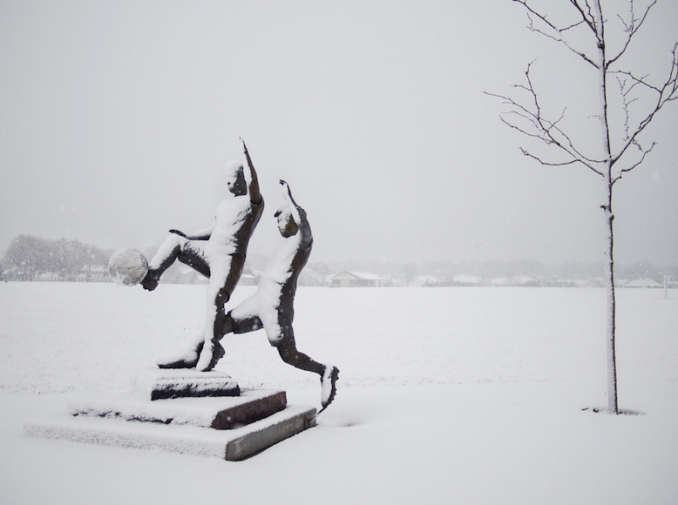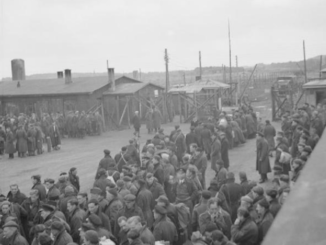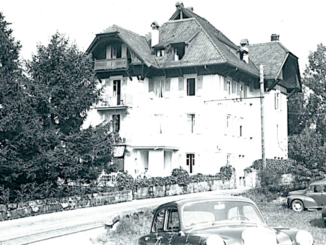
Soccer sculpture in falling snow,
Jereme Rauckman – Licence CC BY-SA 2.0
Yes, I know it isn’t Boxing Day, it’s the day after, but not being around a century ago I can’t repeat the newses from those days with the usual mildly exaggerated and slightly embellished personal recollections.
Therefore, I’m relying on our friends at the British Newspaper Archive to keep you ‘Going-Postal standard’ informed by reading through the editions of 27th December 1924. Added to which, I am typing away on Boxing Day. At Going-Postal HQ we never rest. Bank Holidays are for wimps. Plus, it’s traditional for the unread, uncommented-upon articles to be hammered out in a panic at the last minute.
Remaining with convention, traditionally Boxing Day served as a day for giving to the less fortunate, spending time with family and enjoying various sporting events. In 1924, the day was marked by the usual blend of these customs, set against the backdrop of a country recovering from the First World War and experiencing significant social and political change.
Named from the practice of giving boxes containing gifts or money to servants and the needy, by the nineteen-twenties the day had evolved into a public holiday characterised by leisure activities and sport. One hundred years later, there is still a full sporting fixture today that runs from football to fox-hunting.
These days, the Wenduball matches are all on the telly. Not all sweat, words and panic during a bank holiday, at 12:30 pm your humble author will be settling down to view Man City (lose again?) against Everton. Adding interest to the proceedings, promising young Everton centre-back and England internationalist Jared Branthwaite played for my Local XI. At the academy level, he starred in the same team as one of my sons.
Thanks to the confusion oft wrought in an under-13s changing room – win, lose or draw – and owing to the synthetic longevity and thermal qualities of such things, as I sit at the keyboard on a brisk Debatable Land’s December morn, I am wearing a pair of Jared’s old socks.
In a world gone mad, but a single degree of separation stands between a sexagenarian seven-a-side hacker and the Etihad.
Although the skill side of the game missed a generation with me, Wendyball ability runs in the family. As my Local XI entertain visitors in a vital first versus second clash this afternoon, I’m reminded of my Uncle Hughie, who played for them before the war and who was also a runner.
Once more, the single degree of separation appears. This time, relevant to the newspaper reports from Christmas-time 1924.
One of the sporting events spread across the festivities ten decades ago was Edinburgh’s Powderhall Sprints with the following paragraph appearing in the newspapers on December 27th 1924:
POWDERHALL The pedestrian season opened at the Powderhall grounds, Edinburgh yesterday when the Christmas half-mile handicap was decided. H. McMillan of Hagganfield, on the 75-yard mark, was the winner. He beat George Smith of Edinburgh (90 yards) by one yard, John Orr of Forth (55 yards) was third. The winner’s time was 2 mins 4.5 secs. The betting, 1-3 McMillan, 5-1 Orr, 6-1 Smith.
Nothing ‘pedestrian’ about those timings, with the winner completing the 880 minus 75 yard distance in just over two minutes. As the reader will have spotted, the runners set off at different points on the track. How so? The Powderhall website explains. “Traditionally in foot racing, a slower runner is given an advantage by starting up the field. Each runner’s start, or handicap, is assigned by the handicapper of the meeting. A runner’s handicap is usually dependent on their past performances as well as the handicapper’s assessment of the runner’s ability.”
Hold on a minute? The betting! Not quite beholden within in the Olympian spirit, the athletes were professionals and competed for prize money. In better times, besides cash, you could also win things like ashtrays and boxes of a 1,000 cigarettes. Don’t be fooled by the absence of a Worth-Saying on the bookie’s board. To preserve their amateur status, gentleman athletes ran under assumed names.
Hughie’s mother was a McMillan, so he ran under her maiden name. But is this the same H. McMillan? Possibly. Historic records do show the family residing in the North Glasgow tenements close to Hagganfield.
On the other hand, at the turn of 1925, he was just shy of his sixteenth birthday day. So, maybe not. As with Jared Branthwaite of Everton and England, if you’re good enough, you’re old enough — shifting any balance of doubt towards my mother’s eldest sister’s husband when he was a very young man.
Returning to the Wendyball, today’s players complain they play too many matches. Maybe they do, but unlike in 1924, they don’t have two in two days. Both Christmas Day and Boxing Day 1924 held a complete fixture list.
Some Christmas Day games catch the eye. Man City lost (again) at home to West Brom. Bury were in the top division and drew 1-1 with Tottenham. Clapton Orient and South Shields were in the second tier, usefully known in those days as the Second Division. At the same level of the game, as if The Rangers or The Celtic, the blue and white half of Sheffield appeared in the results and tables as ‘The Wednesday’.
In the Third Division South, the big derby game saw Abedere entertain Merthyr Town, with the home side enjoying Valley bragging rights following a 2-0 win.
The Third Division North held the likes of long-gone Ashington, Durham City, Wigan Borough and Nelson. Despite it being a century ago, more familiar names have not only survived but remain in the lowest tier: Bradford, Doncaster, Grimsby, Chesterfield and Crewe still compete in the bottom division despite a further century of kicking the ball about.
As for my Local XI, they didn’t enter the Football League until 1928. Puffins hoping for a massive centenary celebration four years from now may be disappointed. This Boxing Day’s vital first versus second clash sees them second bottom of the league with visitors Morecambe first bottom.
On Boxing Day 1924 many fixtures were the reverse of the Christmas Day matches. Aberdare’s short-lived blagging rites ended with a 3-1 loss at Merthyr. Man City lost (yet again) to West Brom but this time at the Hawthorns.
It is not only in sport that the more things change, the more they stay the same.
As there was a new government earlier this year, likewise a vote of confidence loss by Stanley Baldwin’s Conservatives resulted in Ramsay MacDonald forming a new Labour government in 1924. Only surviving for nine months, Puffins will be hoping for yet another one degree of separation coincidence, this time in politics.
Fingers crossed and Happy New Year!
© Always Worth Saying 2024



